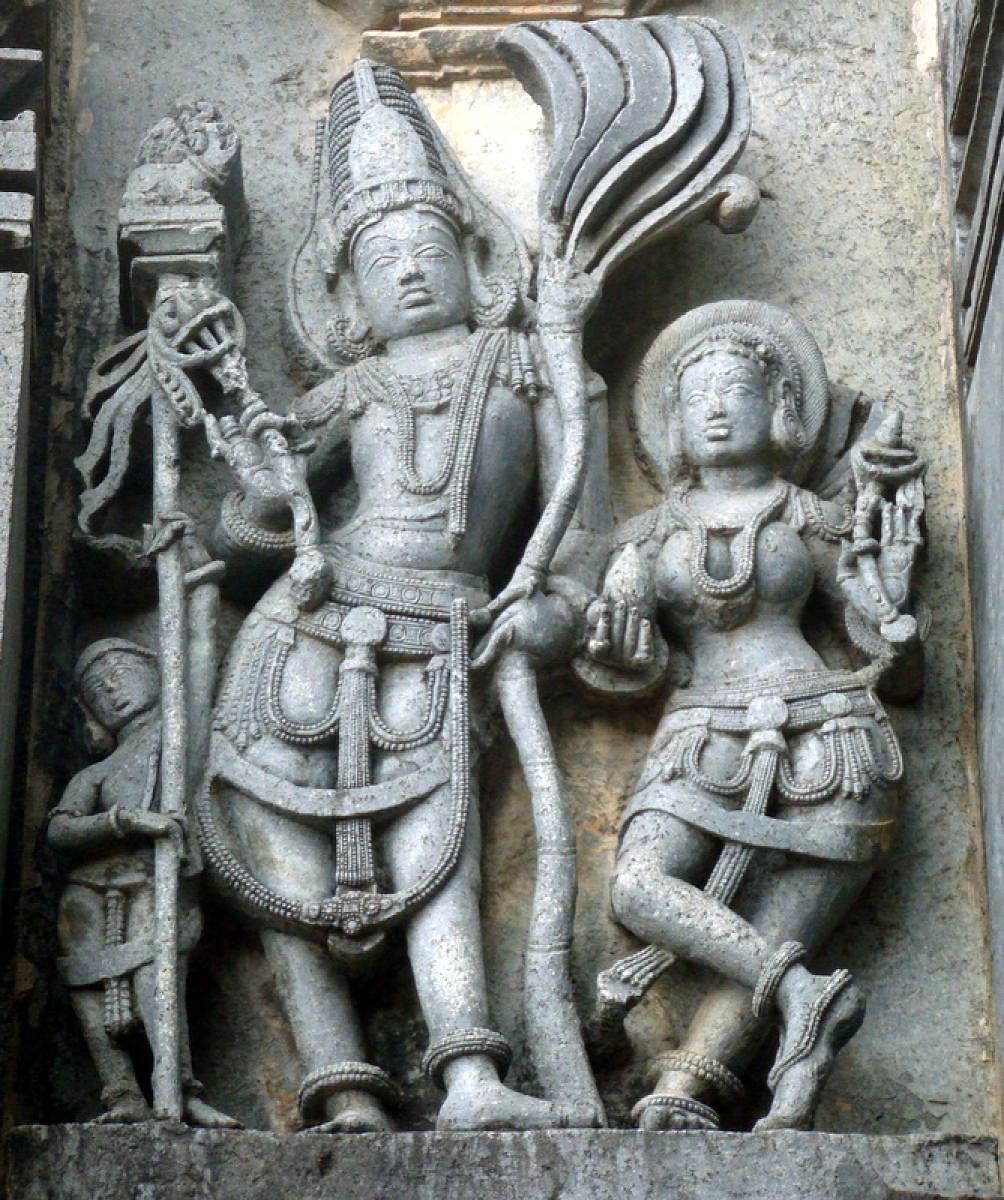
Pandava brothers, disguised as Brahmins, set out for Panchala to attend Dropathi’s swayamvara. Dharmaraya asked one of the other Brahmins, who were also going to Panchala, how far Panchala city was. The Brahmin said, ‘There are two routes to Panchala. Though one of them is shorter, we are not taking that route because a demon called Angagoruba lives in the town the route passes through. He devours anyone passing that way.’
When Arjuna heard these words, he tried to dispel their apprehensions. ‘Ayya, knowing well it was our brother who killed Bakasura, why are you afraid? Have no fear! We are with you!’
After Arjuna had persuaded them with these words, the Brahmins walked with them to Angagoruba’s town. When Angagoraba sighted these Brahmins, he charged towards them, swinging his teak-tree-like arms and roaring. He was like a huge coconut palm, joining the earth and sky, with a head the size of a big boulder, and hair which swept the ground. His ears on either side were like two boats. He had a single eye, as large as a big bamboo plate, in the centre of his face. His wide-open mouth appeared like the entrance to a fort, each of his canines being longer than a yard, and his tummy the size of a mountain. His thighs resembled the trunk of a banyan tree, while each of his buttocks was the size of a boulder. His legs were like the columns of a palace, and his feet had the earth shaking under them. His body was black like tar and his voice sounded like thunder.
At the sight of this terrible-looking monster, the Brahmins ran helter-skelter screaming. Arjuna, taking out his bow and arrows, told them not to be afraid. He was about to shoot an arrow when Narada rushed down from the sky and stopped him.
‘Calm down, Arjuna! You should not kill Angagoruba. You are going to benefit a lot from him and he from you.’
Finding courage at the sight of Narada, the Brahmins stopped running and touched the sage’s feet. Narada told them all the story of Angagoruba.
‘He was born as an ugly demon due to a curse. Because of his unsightly looks, folks called him Angagoruba. In his previous birth, he was more handsome than anyone on earth. He is paying for the wrong he committed.’
‘You know about Manmatha, don’t you? This fellow is Manmatha’s brother, Chinmatha. The gods, for their own benefit, had Manmatha burnt to ashes. Chinmatha, in his desire for revenge against the gods who caused his brother’s death, used his power to attract their wives.
He was so good-looking that no woman could resist him. But the wretched fellow made one false move. He went for Devendra’s wife, Shachi. Devendra, in his fury, cursed him:
‘You have grown arrogant because you think, with your handsome looks, you can make any woman fall for you. Therefore, be born on earth as the ugliest creature in the world.’
Realizing his mistake at once, Chinmatha fell at Indra’s feet and begged his forgiveness. Indra said to him,
‘A curse once uttered cannot be taken back. But a drop of blood from Hiranyaksha, who was killed by Lord Vishnu, has taken the form of the Maricha crow, which is ruining the meditation of devotees. This crow cannot be seen or caught, but only heard. Only an archer, who knows the art of Shabdavedhi, can shoot down the Maricha crow. When that happens, a drop of blood will fall on your head. You will then regain your handsome form as Chinmatha.’
‘You will achieve this feat, Arjuna. So don’t kill him. The powers Angagoruba is going to give you will bring you happiness throughout your life. Go on then to Drupatha’s kingdom.’
With these words, Narada gave his blessings and saw them off to Panchala city.
Translated by Laxmi Chandrashekar
The author, a retired professor of English, is a well-known theatre and television artiste and an award-winning translator.
Folktales from the Mahabharata is a monthly column that features lesser-known episodes from ‘Janapada Mahabharata’ sung by eminent folk-artiste Bettada Beedu Siddhashetty; it was collected, edited, and published by Dr P K Rajashekara.